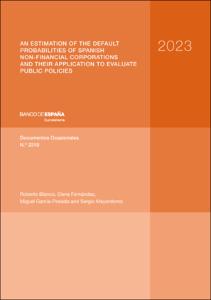An estimation of the default probabilities of Spanish non-financial corporations and their application to evaluate public policies
Autor
Fecha de publicación
5-sep-2023
Descripción física
33 p.
Resumen
Este documento modeliza la probabilidad de impago a un año de las sociedades no financieras españolas utilizando información del período 1996-2019. Mientras que, en general, la literatura previa considera que una empresa está en situación de impago si solicita concurso de acreedores, aquí se define dicha situación como tener préstamos dudosos durante al menos tres meses en un mismo año. Esta definición más amplia permite predecir problemas financieros en una fase más temprana, antes de que estos sean demasiado graves y las empresas tengan que recurrir a procedimientos formales de insolvencia o a reestructuraciones privadas de deuda, lo que generalmente no puede ser observado por el investigador. En concreto, se estiman mediante regresiones logísticas tanto un modelo general que hace uso de todas las empresas de la muestra como seis modelos para diferentes combinaciones de tamaño y sector productivo. Las variables explicativas seleccionadas son cinco ratios financieras, que resumen la calidad crediticia de las empresas, y el crecimiento agregado del crédito a las sociedades no financieras para capturar el papel de la disponibilidad de crédito en mitigar el riesgo de impago. Finalmente, se llevan a cabo dos aplicaciones prácticas de estos modelos de predicción: se construyen matrices de transición de calificaciones crediticias y se evalúa el programa de ayudas directas del Gobierno español durante la crisis del COVID-19.
We model the one-year ahead probability for default of Spanish non-financial corporations using data for the period 1996-2019. While most previous literature considers that a firm is in default if it files for bankruptcy, we define default as having non-performing loans during at least three months of a given year. This broader definition allows us to predict firms’ financial distress at an earlier stage that cannot generally be observed by researchers, before their financial conditions become too severe and they have to file for bankruptcy or engage in private workouts with their creditors. We estimate, by means of logistic regressions, both a general model that uses all the firms in the sample and six models for different size-sector combinations. The selected explanatory variables are five accounting ratios, which summarise firms’ creditworthiness, and the growth rate of aggregate credit to non-financial corporations, to take into account the role of credit availability in mitigating the risk of default. Finally, we carry out two applications of our prediction models: we construct credit rating transition matrices and evaluate a programme implemented by the Spanish government to provide direct aid to firms severely affected by the COVID-19 crisis.
We model the one-year ahead probability for default of Spanish non-financial corporations using data for the period 1996-2019. While most previous literature considers that a firm is in default if it files for bankruptcy, we define default as having non-performing loans during at least three months of a given year. This broader definition allows us to predict firms’ financial distress at an earlier stage that cannot generally be observed by researchers, before their financial conditions become too severe and they have to file for bankruptcy or engage in private workouts with their creditors. We estimate, by means of logistic regressions, both a general model that uses all the firms in the sample and six models for different size-sector combinations. The selected explanatory variables are five accounting ratios, which summarise firms’ creditworthiness, and the growth rate of aggregate credit to non-financial corporations, to take into account the role of credit availability in mitigating the risk of default. Finally, we carry out two applications of our prediction models: we construct credit rating transition matrices and evaluate a programme implemented by the Spanish government to provide direct aid to firms severely affected by the COVID-19 crisis.
Publicado en
Documentos Ocasionales / Banco de España, 2319
Materias
Impago; Problemas financieros; Préstamos dudosos; Regresión logística; Default; Financial distress; Non-performing loans; Logistic regression; Estructura y funcionamiento de la empresa; Riesgos y liquidez; Instituciones crediticias de depósito; España
Aparece en las colecciones:












